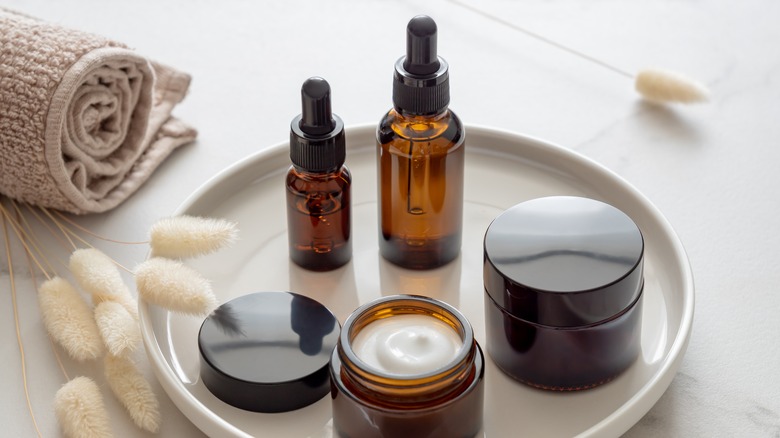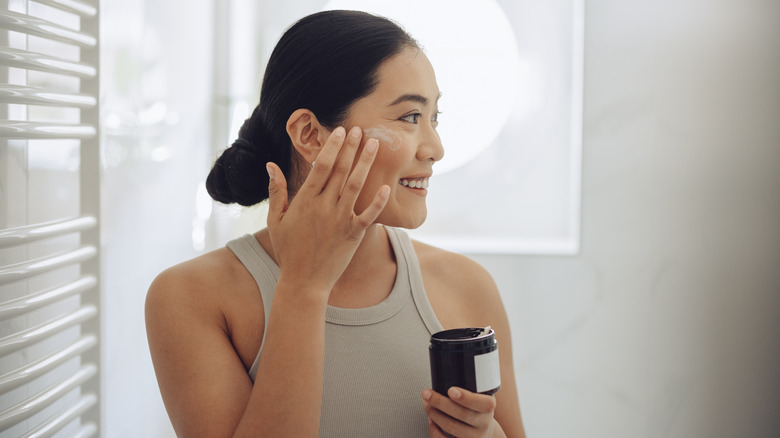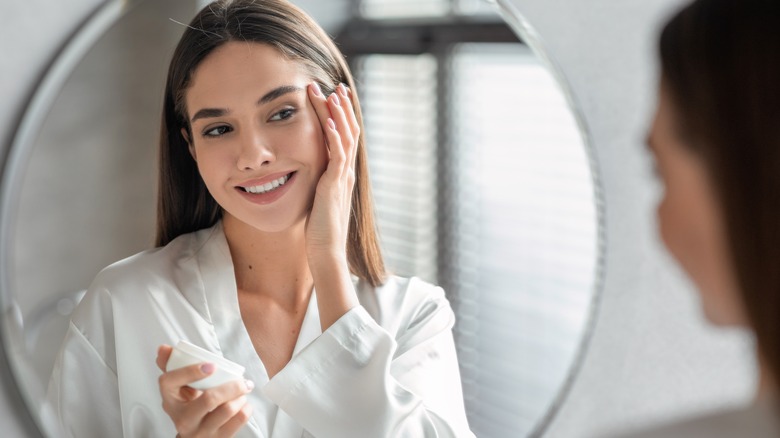Why You Shouldn't Put Skincare Into Jars (Despite How Cool It Makes Your Bathroom Shelf Look)
Let's be real here: It doesn't look very chic to have the bottles of your skincare regimen laying on your bathroom counter. However, if you have a little itch to rearrange these products to better fit the environment, you aren't alone. Beauty influencers on platforms like TikTok have advocated for product decantation as an effective way to make your bathroom counter more spacious and aesthetically friendly. The problem is, we shouldn't be putting our skincare products into jars — no matter how chic it looks.
Transferring creams, liquids, gels etc. out of their original bottles and into new ones is a process called decanting. It has the potential to cause some surprising drawbacks, such as product degradation, discoloration, or even contamination. This is especially true if you want to put them in clear containers, which experts say can expose the products to UV radiation.
"Light exposure through a clear bottle could affect the quality of the product," Leanne Stapf, the chief operating officer of The Cleaning Authority, told Apartment Therapy. "The less transparent the container, the more it will preserve the product."
Recant the decant
Many skincare products come in the packaging they do for good reason. According to the International Journal of Environmental Research and Public Health, the popular skincare ingredient retinol has been shown to absorb UV lights when exposed for long periods of time. As a result, the ingredient begins to degrade, impacting the product's effectiveness. This is precisely why products containing retinol and other similar ingredients are in very opaque or even solid containers. Unfortunately, when some of the chicest bathroom containers for skincare are more transparent and clear, this can pose a problem.
The transfer of large quantities of bacteria is also a potential risk of decanting skincare products. According to Pfizer, human hands typically carry more than 3,000 types of germs at any given point. You're already risking cross-contamination by sticking your fingers in a tub of lotion, as pointed out by Allure — and products that come in a pump or squeeze bottle might not be formulated for that constant exposure to air and contaminants. Try to limit that contamination to an absolute minimum by keeping your moisturizer in its original container.
Be mindful of the packaging
One might think they are able to transfer products with sensitive ingredients into new packaging if they are extra careful — perhaps wearing anti-germ gloves and using sterilized instruments and containers. The reality is, this is frankly too much work to do when your skincare already has its proper packaging. Think of it like this: would you rather spend time completing your best skincare routine or risk making a mess of transferring your routine into different packaging?
What's important to remember is that the manufacturers behind the products lining up your bathroom counter likely did tons of research into how to best sell their skincare. As such, they came in their packaging for a reason. Given how the risks outweigh the benefits, don't try and decant your products. It is always better to be safe rather than sorry, especially since decanting your skincare routine into different packaging doesn't guarantee effectiveness. Your products and skin will thank you!


